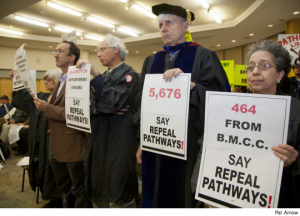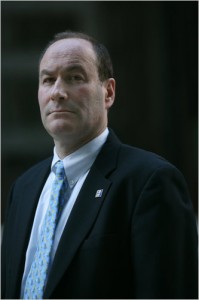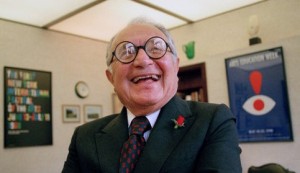Taking CUNY to Court
The battle over CUNY’s Pathways initiative continues to rage, and has expanded further into the courts. The beginning of August witnessed a concerted new push by the University Faculty Senate (UFS), which filed a lawsuit against the implementation of Pathways in the CUNY system arguing that it would stand in contravention of New York’s Open Meetings Law. At the heart of this claim is the fact that at six CUNY campuses—Baruch, John Jay, Staten Island, Lehman, BMCC, and Queensborough—the Pathways initiative has been rejected by each school’s respective faculty senate. And still, university administration forged ahead, submitting revised Pathways proposals which were then considered behind closed doors. CUNY’s policy on curricular design is unambiguous about the rule demanding that all debates over new proposals be held in public and advertised with appropriate advance notice. All proposals, furthermore, must meet with faculty senate approval. Neither condition in these instance were met.
At the same time, the University Faculty Senate, in partnership with the PSC, have pushed ahead with an earlier proposal to design and ultimately implement an alternative plan which would address CUNY’s concern about student transfer between the system’s junior and senior colleges. In a statement released at the end of the spring semester, the UFS and PSC representatives were clear in their intentions. “We plan to begin with an examination of the scale of the current problems in student transfer, a survey of existing best practices, and a study of the success and failure of the articulation agreements currently in place. Our discussion will also include the question of additional resources for CUNY; we believe that a meaningful solution to the student transfer problem will require more funding, not less. And we may consider how new technology, including some currently being implemented at CUNY, could be reshaped to address the needs of transfer students.” Efforts in this direction were undertaken at the beginning of summer recess, and will continue through the fall semester. The Advocate will continue to report on Pathways-related news as it develops in the coming months.
CUNY Brass Increase Spending…On Themselves
School recess periods are always a good time to bury shitty news, as the CUNY Sith well knows. In June, the CUNY Board of Trustees (BoT) met to approve a resolution that would grant a sweeping collection of salary increases for top bureaucrats across the university. The numbers are simply staggering, especially—and we can’t emphasize this enough—as budgets for spending on students and faculty are being pillaged by state legislators. The BoT was in a generous mood. They originally resolved to increase the salary of Lord Vader by some 50 percent, from $470,705 to $724,470. Holy fuck! But the chancellor isn’t the only the only CUNY exec whistling all the way to the bank. His vice-henchmen would enjoy pay raises of between $50,000 and $100,000 each. College presidents also make out like bandits: those at the junior college level would make upwards of $325,000, while the ones running the prestigious senior schools rake in around $370,000.
A gathering of students and outraged faculty protested the vote while the board was busy passing the resolution, highlighting the stark contrast between students struggling to make ends meet while CUNY’s executive class treated themselves to a pay hike, one many believe is undeserved. The response from the board, if our old friend Jeffrey Wiesenfeld is any indication, couldn’t be clearer—fuck off. “It’s just needless rancor,” Wiesenfeld told reporters, referring to what he calls “this extreme striving for egalitarianism…that’s forced on the Board, [when] students and others could be using their energy more productively.” We’re glad to see old Jeff’s penchant for charm hasn’t dimmed.
When the Going Gets Tough, the Tough Go Shopping…for New Real Estate
Artist’s Sketch of CUNY’s proposed new science complex in Harlem.
You might think that sweeping budget cuts, and the larger economic crisis that continues to chomp down on the 99 percent of Americans not blessed with extreme affluence, would dissuade decision makers in the CUNY system from speculating in property markets throughout New York City. But then, you wouldn’t be Matthew Goldstein. Over the summer, as the university continued to push its vision of austerity for students and faculty, CUNY’s head hanchos were busy figuring out how to spend enormous sums of money on buildings real and imagined across the city.
A few years back, Big Pharma heavyweight Pfizer cleared out of its offices along East 42nd Street, leaving the owner of the space, the Durst Organization, with trouble filling the gap. With leasing markets struggling, and purchasing markets not much better, Durst had difficulties capitalizing off their property. Until CUNY came along, that is. In a megadeal, which is being touted as a sale, but looks suspiciously like a long-term lease, Durst sold its 170,000-square-foot office condominium to an eager CUNY for roughly $120 million. Because CUNY qualifies as a non-profit organization, it will be allowed to skirt having to pay any real estate tax on its new acquisition. After thirty years, the ownership of the building will revert back to the Durst Organization.
It’s not clear where the money to make the purchase will come from, though CUNY has confirmed that it is looking to dump its Death Star at 535 East 80th Street, and has put it on the market. At the same time, proceeds from the much hoped-for sale would not go to covering the cost of buying land on 42nd Street, but would be directed instead at the construction of a 200,000-square-foot “research center” in Harlem, the jewel in the crown of its “decade of sciences” initiative, whatever that means.
But Chancellor Goldstein and friends aren’t content to contain themselves to Manhattan on this shopping spree to acquire and develop what’s left of the New York City real estate market. Crain’s reported at the end of August that CUNY had also retained a high octane real estate firm, Cushman and Wakefield, to help guide the university through the process of constructing a hotel in Queens. Located on the campus of LaGuardia Community College, the site under speculation would be home to a gigantic, possibly 600,000-square-foot luxury hotel that would benefit, so says CUNY, students studying for careers in the hospitality industry. As of now, no possible hotel partners for this scheme have been identified. So the question is: how can CUNY continue financing multimillion dollar schemes such as these, while increasing payouts to its top bureaucrats, while at the same time claiming poverty when it comes to spending on students, faculty and staff throughout the university system? Hospitality indeed.
Hope for Adjunct Healthcare?
It was a busy summer for members of the PSC tasked with negotiating continued health care coverage with representatives from CUNY. It has been increasingly clear that the package of health care benefits designed over thirty years ago for part-time labor in the CUNY system is no longer sustainable. In the original agreement, CUNY had agreed to finance coverage with payments that did not increase with time, even as the cost for healthcare ballooned exponentially. As a consequence, the PSC Welfare Fund had to make up the difference which eroded the fund’s capital wherewithal to sustain the program much longer.
The Union has been demanding deep structural changes for a few years now, and the pressure they’ve brought to bear seems to being paying off, if slowly. First, the PSC called on CUNY to request money for health care coverage from state legislators in Albany, an appeal that was granted last year. With the possibility of collapse safely averted, PSC representatives began working with CUNY brass on structuring a new plan of coverage for adjuncts that would offer comparable services with minimal to no loss of benefits. The process has steadily progressed, according to union officials, but movement has been at a snail’s pace. “When it comes to medical coverage,” Michael Bastion, a member of the PSC negotiation team and an adjunct himself, told the Clarion newspaper, “every detail is important, and settling these issues has required many, many hours of discussion. We know how important it is to get this right.”
As the Advocate went to press, a compromise solution had yet to be reached. Yet when it arrives, time could be of the essence. “We need to have a reliable way to reach you as quickly as possible, as there may be a need to enroll in a new insurance program on very short notice,” says Larry Morgan, executive director of the PSC-CUNY Welfare Fund. Affected adjuncts would do well to stay on top of things by joining the PSC emergency alert listserv. To sign up, visit http://www.psc-cuny.org/our-benefits/form/adjunct-email-addresses.
Martin E. Segal, RIP
Martin E. Segal, after whom one of the Graduate Center’s theaters is named, passed away over the summer. The former chairman of Lincoln Center, and founder and executive director of the Lincoln Center Film Society, was also an active member here at CUNY, and a unstinting friend to the Graduate Center. President Bill Kelly remarked that “His formal association with the Graduate Center began in 1983, when President Harold Proshansky asked him to serve on the Board of Visitors. In 1996, he agreed to serve on the Graduate Center Foundation Board, and for the next twelve years he was an active benefactor and advocate for the Graduate Center. Marty made many generous gifts to the Graduate Center, he inspired his friends to support the GC, and he wrote passionate and persuasive letters to politicians to urge them to maintain and support New York State funding for the Graduate Center and CUNY. In short, he was one of our greatest champions. His name will live on at the Martin E. Segal Theatre Center and his memory will guide and inspire us. We will miss him very, very much.” Martin E. Segal was ninety-six years old.




